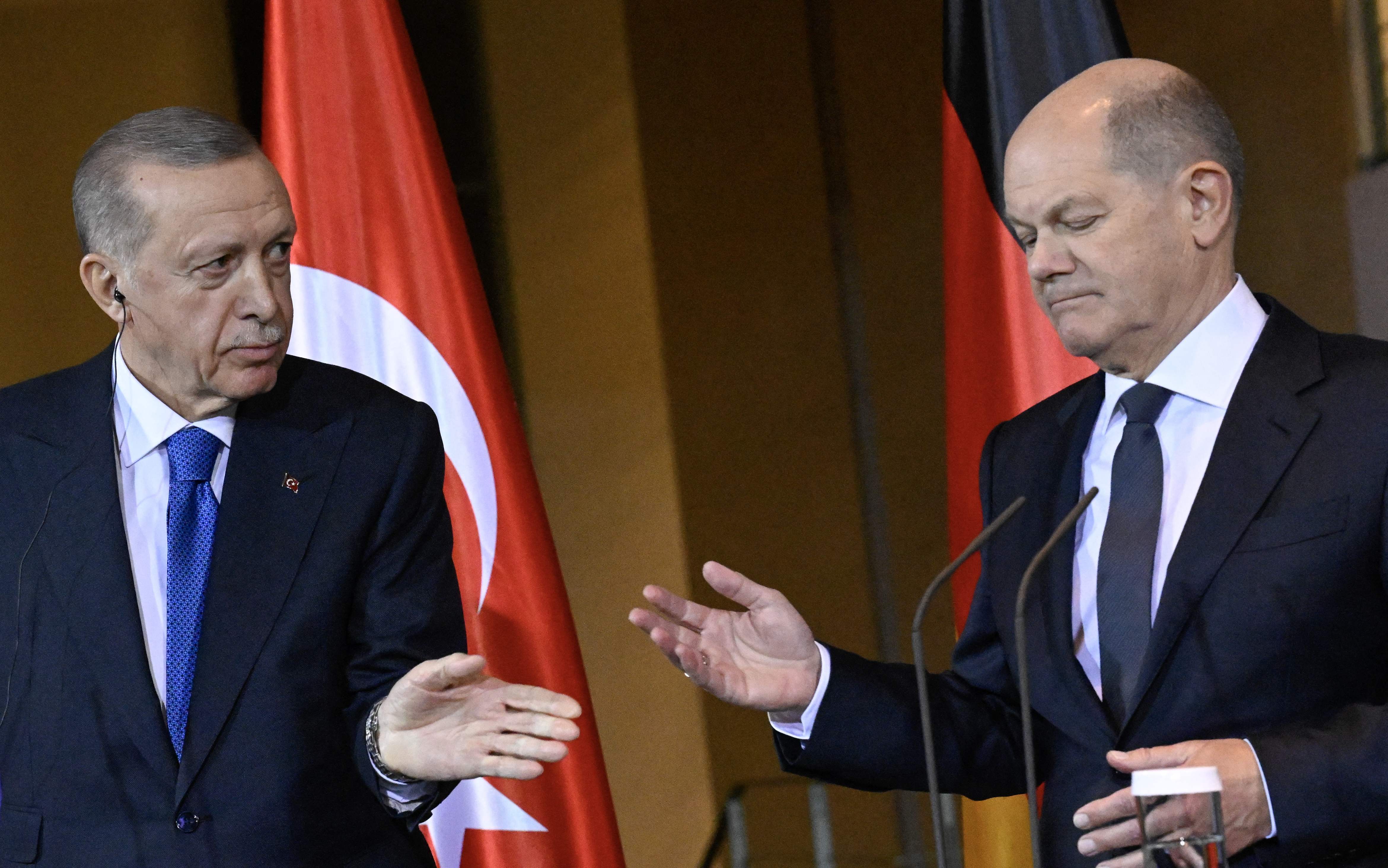Germany unwilling to criticise Israel because of Holocaust guilt, says Turkey’s Erdogan
Turkish president holds tense press conference with chancellor Olaf Scholz on visit to Germany
Your support helps us to tell the story
From reproductive rights to climate change to Big Tech, The Independent is on the ground when the story is developing. Whether it's investigating the financials of Elon Musk's pro-Trump PAC or producing our latest documentary, 'The A Word', which shines a light on the American women fighting for reproductive rights, we know how important it is to parse out the facts from the messaging.
At such a critical moment in US history, we need reporters on the ground. Your donation allows us to keep sending journalists to speak to both sides of the story.
The Independent is trusted by Americans across the entire political spectrum. And unlike many other quality news outlets, we choose not to lock Americans out of our reporting and analysis with paywalls. We believe quality journalism should be available to everyone, paid for by those who can afford it.
Your support makes all the difference.Germany is unwilling to criticise Israel’s conduct in the war with Hamas because of its “psychology of guilt” over the Holocaust, Turkey’s president Recep Tayyip Erdogan has suggested.
At a tense joint press conference during Mr Erdogan’s first visit to Germany since 2020, chancellor Olaf Scholz said it was no secret they held “very different views on the conflict”, which was reignited on a level not seen in decades by Hamas’s brutal cross-border massacre of 1,200 Israelis on 7 October.
“The Israeli-Palestinian war should not be evaluated with a psychology of guilt. I speak freely because we do not owe anything to Israel,” Mr Erdogan told reporters, before the two leaders held private talks.
“Those who feel indebted to Israel cannot speak freely. We did not go through the Holocaust process, we don’t have such situation, because our respect for humanity is different,” the Turkish president added.

Deep atonement for the Holocaust – which saw the genocide of six million Jews and five million others – is at the heart of Germany’s post-Second World War identity. The state of Israel was founded three years after the war ended as a safe haven for Jews.
Mr Scholz did not respond directly to the remarks but restated Germany’s commitment to Israel’s right to defend itself, adding: “If you know Germany, you know that our solidarity with Israel is beyond all question. Israel has the right to defend itself. At the same time all lives are equally precious and the suffering in Gaza distresses us.”
More than 12,000 Palestinians – including 5,000 children – have been killed in Israeli attacks on the densely-populated strip since 7 October, according to the health ministry in Hamas-run Gaza, in figures deemed credible by the United Nations.
“There is hardly any place left to call Gaza. Everything has been razed to the ground,” said Mr Erdogan.

But the Turkish president stopped short of repeating his more controversial remarks made in recent days, in which he labelled Israel a “terror state” and said its legitimacy was “being questioned due to its own fascism” – an assertion dubbed “absurd” by Mr Scholz in the run-up to the visit.
During Friday’s press conference, Mr Scholz said it was “no secret that we have very different perspectives on the conflict”, adding: “That’s why our conversations are important. Especially in difficult moments, we need to talk to each other directly.”
While Mr Scholz had faced some domestic pressure to cancel the visit, planned since May, German commentators noted the need for cooperation after geopolitical tensions caused by repression in Turkey in the wake of its 2016 coup attempt.
Germany is also home to a vast Turkish diaspora of nearly 3 million people, roughly half of whom hold voting rights there.

While Mr Scholz – who is dealing with a €60bn hole in his budget, a coalition row over the economy and rising immigration – needs Ankara’s help in stemming migration to the EU, Mr Erdogan could also benefit from Berlin’s backing for modernising Turkey’s customs union with the EU and visa-free EU travel for Turks, ahead of key local elections.
A question of whether Germany could potentially block the sale of 40 Eurofighter jets to Turkey also brought a moment of tension, as Mr Erdogan insisted he could procure the jets from “many other places” if Berlin rejected the deal, and berated the journalist who raised the issue.
Mr Scholz declined to respond when asked whether he would approve the sale.
Additional reporting by Reuters

Join our commenting forum
Join thought-provoking conversations, follow other Independent readers and see their replies
Comments